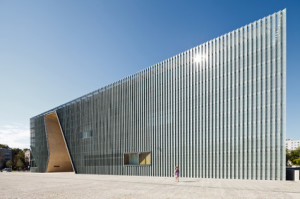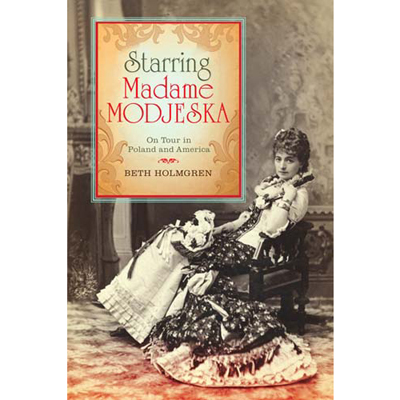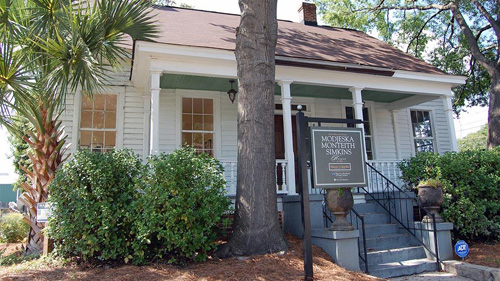
Modjeska Monteith Simkins house in South Caroline; it will soon open for tours.
PHOTO via Historic Columbia
We have Beth Holmgren to thank for bringing to our attention the wonderful connection between two great women, Modjeska Monteith Simkins and Helena Modjeska. Modjeska Monteith Simkins, considered the matriarch of South Carolina’s civil rights movement, was a fearless civil rights activist, an advocate for the poor, a teacher and a public health worker. She remained active even in her 80s, taking on new causes such as environmental issues. “She could never figure out why politicians passed laws as if they drank different water and breathed different air than the rest of us,” activist Merll Truesdale said. At age 90, Simkins received the Order of the Palmetto, South Carolina’s highest civilian honor.
Simkins’ parents named her after famed Polish-American actress Helena Modjeska, an artist they admired for her performances of classical drama. Helena Modjeska received many honors, and this one is certainly among the best.
The home of Modjeska Monteith Simkins, Columbia Cottage, in Columbia, SC, will soon be open for tours.
Polin, Warsaw’s Museum of the History of Polish Jews has won the Finlandia Prize for Architecture, selected by the Finnish Association of Architects (SAFA).
The magnificent museum was designed by Lahdelma & Mahlamäki Architects.
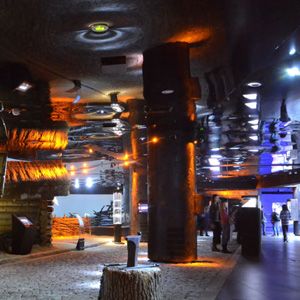
The Rynek Underground exhibit showcases Kraków’s rich history and its connections with medieval Europe’s chief trade & culture center.
PHOTO via the Historical Museum of the City of Kraków
There are eleven new museums in Poland that are a must-see. They cover a broad range of Polish history and culture. The above-mentioned Museum of the History of Polish Jews; the heartbreaking and heroic history of the Warsaw Uprising and a Home Army Museum; The European Solidarity Center celebrates freedom, because freedom is a Polish specialty; The Chopin Museum needs no further information; MOCAK is the new Museum of ‘Contemporary Art in Kraków; the Rynek Underground is a branch of the Historical Museum of the City of Kraków and, as the name suggests, it is located directly below the main market square; The Copernicus Science Center; and many more.

Andrzej Panufnik
Via his website
This could be a good spot to remember composer Sir Andrzej Panufnik, whose 100th birthday was celebrated last year at King’s Place in London. His works were premiered by the greats: Seiji Ozawa, Andre Previn, Sir Georg Solti, Yehudi Menuhin, among others, and yes, he was knighted by Queen Elizabeth II in 1991. But Sir Andrzej was also the composer of the much loved song of the resistance, “Warszawskie dzieci” (Warsaw’s children) and Tragic Overture, composed “under the influence of the fear and horror of our daily life, and my agonizing sense of worse things to come,” and dedicated to his heroic brother, Mirek. During the occupation, he played in underground cafes, together with his friend Witold Lutosławski, “in order to hold in check the emotions which I felt were threatening my sanity.” Vilified by the communists after the war, he defected in 1954.
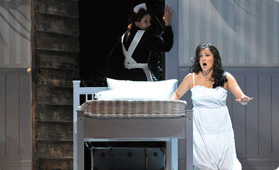
Via The Met Opera
Meanwhile in New York, Polish opera and film director Mariusz Trelinski is directing “Iolanta” and “Bluebeard’s Castle” in a co-production by The Metropolitan Opera and Teatr Wielki-Polish National Opera. The music, the voices, the production are receiving nothing but praise but not entirely without politics. Seems Russian soprano Anna Netrebko and Maestro Valery Gergiev are fans of Vladimir Putin and his policies both in Crimea and towards gays. Read more here.
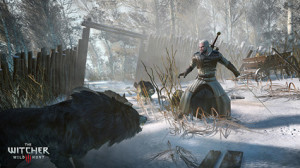
Still from The Witcher 3
And on a lighter note, video game enthusiasts may be interested in The Witcher 3: Wild Hunt.
The game is inspired by the fantasy world created by the Polish writer Andrzej Sapkowski and created by the Warsaw-based company CD Projekt RED. Read more about it here.
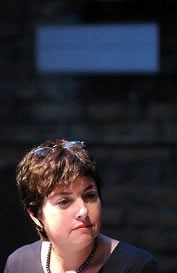
Clare Cavanagh
Via Northwestern University’s website
And finally, on a more serious note:
Those of us who were around before 1989 remember that Eastern Europe was considered non-existent. Now Eastern Europe is “Non-strategic,”pretty much the way the humanities are non-strategic.
Clare Cavanagh, professor of Slavic Languages and Literatures at Northwestern University and award-winning translator of Polish poetry, wrote an essay that “defends the centrality both of literary and Eastern European studies in the twenty-first-century curriculum.” Bravo Professor Cavanagh. One hopes the communities affected will engage in some strategic support for these programs.
